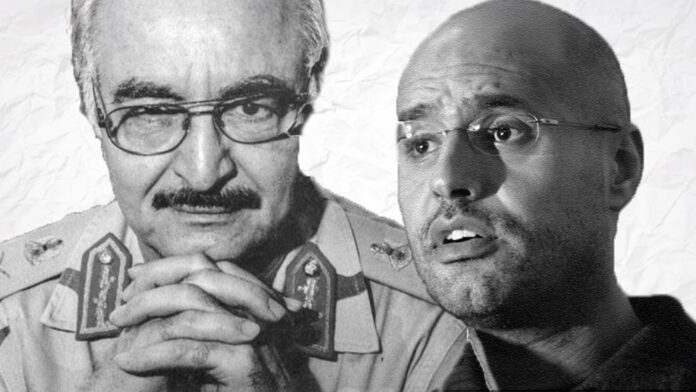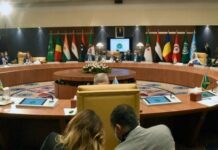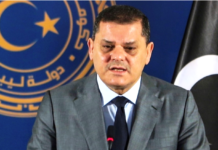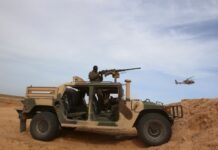Saif al-Islam Gaddafi submitted his candidacy for the Libyan presidential election on Sunday. However, the prosecutor of the military court of Tripoli ordered the suspension of this one, as well as that of Haftar.
Is the candidacy of Saif al-Islam Gaddafi being questioned? As soon as the candidacy filed, a letter and an indictment from the military court prosecutor were sent to the head of the Libyan High Electoral Commission (HNEC), ordering the latter to suspend the candidacy of Saif al-Islam Gaddafi for the presidential election on 24th December.
The same document lists the crimes that the court attributed to Gaddafi’s son as well as to Marshal Khalifa Haftar. The latter had announced his candidacy shortly after the promulgation of the electoral law and the filing of his candidacy was scheduled for this week. The prosecutor is not ordering the suspension of Haftar’s candidacy but is urging the HNEC to do so if it is filed this week.
Imad al-Sayeh, head of the HNEC, immediately complied by suspending Gaddafi’s candidacy.
The letter was also sent to six organs of the armed forces, as well as to the Interior Ministry. Prosecutor Mohamed Gharouda ordered the arrest of Saif al-Islam Gaddafi, who is now known to be in Libyan territory, and of Khalifa Haftar. He recalls the court ruling condemning Gaddafi to death in 2015, in addition to four cases concerning mass murders attributed to Marshal of the East, Haftar, during the 2019 war.
On the political level, the events of this Sunday, which followed the candidacy of Saif al-Islam Gaddafi, show how Libya can ignite. Amid fears of post-election violence, the rejection of the most popular Libyan presidential candidates could cause chaos sooner than expected.
Which Candidates?
Although the military prosecutor’s letter is legitimate, its timing is questionable, especially since Saif al-Islam Gaddafi already has his electoral card and has presented all the documents necessary for his candidacy. As for Haftar, the head of the Libyan National Army (LNA) resigned his post in time to begin his campaign.
If Gaddafi and Haftar are out, who will be able to run for the coveted post of President of Libya? The future candidate, current Prime Minister Abdel Hamid Dbeibah, his Minister of the Interior Fathi Bachagha, the president of the High Council of State Khaled al-Michri, or the head of the Presidential Council Mohammed el-Menfi are also likely to be concerned by a suspension of their candidacies in the event of filing. The electoral law indeed seems to be tailor-made so that the Libyan justice system rejects most of the candidates.
And to remember, a law that was enacted without a vote, on the sly, by the President of the House of Representatives Aguila Salah, who had proceeded with the promulgation of the text, according to “the recommendations of the UN,” the day after his meeting with the High Representative of the European Union Josep Borrell.
Aguila Salah is close to Haftar, Tripoli’s rival and enemy of the “Gaddafists”.
Is this the start of a latent civil conflict that will prevent the holding of the elections? In any case, the Libyan Presidential Council had openly opposed the early election agenda, as had neighboring and African countries. Openly speaking, with the exception of the UN, EU and UNSMIL, no one really wants these December elections.
Will the West Reconsider its Position?
The real issue for the stability of the country is not the ballot. In this divided and war-stricken country, foreign diplomats keep asking for the departure of foreign troops and the conclusion of talks between Libyan factions before going through the polls. Or else, the election will certainly be a source of conflict.
On these two issues, however, clumsy Western intervention put a stop to the efforts which swear only by the elections. The prospect of a single candidate Haftar, despite being prosecuted for massacres of civilians and war crimes, appealed to part of the international community. Yet, as the demonstrations of joy of the populations showed on Sunday, the candidacy of Saif al-Islam Gaddafi was to restore a little balance on a political scene at the orders of the Western capitals.
It remains to be seen, what will be the next step in Libya, for the executive currently in place. Attacking Haftar is inconceivable, because the man is surrounded by an army always performing. And if Tripoli attacked Saif al-Islam Gaddafi, or tried to capture him, the southern militias would immediately respond.
For both Gaddafi and Haftar, the situation is not as comfortable as it seems. By running as candidates, both men must show that they are ‘presidentiable’. Being at the head of an armed faction is not enough; it is also necessary to guarantee peace in their respective regions. The impending pre-electoral chaos could well push Westerners to reconsider their respective positions on an increasingly explosive Libyan issue.
By Anouar Diden











